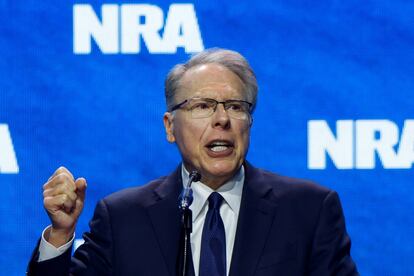NRA chief Wayne LaPierre says he’s resigning days before trial scrutinizing his leadership and spending
LaPierre, executive vice president and chief executive officer, had been in charge of the powerful National Rifle Association since 1991

The longtime head of the National Rifle Association said Friday he is resigning, just days before the start of a New York civil trial that’s poised to scrutinize his leadership of the powerful gun rights organization.
Wayne LaPierre, the executive vice president and chief executive officer, said his departure is effective Jan. 31. He had been in charge of the NRA since 1991. Andrew Arulanandam will become the interim CEO & EVP, the organization said.
The trial in New York Attorney General Letitia James’ lawsuit against him, the NRA and others who have served as organization executives is scheduled to start on Monday. LaPierre and ex-NRA President Oliver North are among the witnesses expected to testify.
LaPierre, 74, has led the NRA ‘s day-to-day operations since 1991, acting as the face and vehement voice of its gun rights agenda. He once warned of “jack-booted government thugs” seizing guns, called for armed guards in every school after a spate of shootings, and condemned foes backing gun control measures as “opportunists” who “exploit tragedy for gain.”
In recent years though, the NRA has been beset by dwindling membership and financial troubles, along with lingering questions about LaPierre’s leadership and spending. One of LaPierre’s top lieutenants, Andrew Arulanandam, will assume his roles on an interim basis, the organization said.
“With pride in all that we have accomplished, I am announcing my resignation from the NRA,” LaPierre said in a statement released by the organization. “I’ve been a card-carrying member of this organization for most of my adult life, and I will never stop supporting the NRA and its fight to defend Second Amendment freedom. My passion for our cause burns as deeply as ever.”
James, a Democrat, accuses LaPierre and other executives of illegally diverting tens of millions of dollars from the NRA and spending organization funds on personal trips, no-show contracts and other questionable expenditures.
James, a Democrat, accuses LaPierre and other executives of illegally diverting tens of millions of dollars from the NRA and spending organization funds on personal trips, no-show contracts and other questionable expenditures. LaPierre is accused in the lawsuit of spending millions on private jet flights and personal security and accepting expensive gifts — such as African safaris and use of a 107-foot (32-meter) yacht — from vendors.
He is also accused of setting himself up with a $17 million contract with the NRA if he were to exit the organization, spending NRA money on travel consultants, luxury car services, and private jet flights for himself and his family — including more than $500,000 on eight trips to the Bahamas over a three-year span.
James is seeking to ban LaPierre and the other executives from serving in leadership positions of any not-for-profit or charitable organization conducting business in New York, which would effectively remove them from any involvement with the NRA.
Some of the NRA’s excess spending was kept secret, the lawsuit said, under an arrangement with the organization’s former advertising agency, Ackerman McQueen. The advertising firm would pick up the tab for expenses for LaPierre and other NRA executives and then send a lump sum bill to the organization for “out-of-pocket expenses,” the lawsuit said.
LaPierre has defended himself, saying in previous testimony that cruising the Bahamas on a yacht was a “security retreat” because he was facing threats after mass shootings. He conceded not reporting the trips on conflict-of-interest forms, testifying: “It’s one of the mistakes I’ve made.”
Sign up for our weekly newsletter to get more English-language news coverage from EL PAÍS USA Edition
Tu suscripción se está usando en otro dispositivo
¿Quieres añadir otro usuario a tu suscripción?
Si continúas leyendo en este dispositivo, no se podrá leer en el otro.
FlechaTu suscripción se está usando en otro dispositivo y solo puedes acceder a EL PAÍS desde un dispositivo a la vez.
Si quieres compartir tu cuenta, cambia tu suscripción a la modalidad Premium, así podrás añadir otro usuario. Cada uno accederá con su propia cuenta de email, lo que os permitirá personalizar vuestra experiencia en EL PAÍS.
¿Tienes una suscripción de empresa? Accede aquí para contratar más cuentas.
En el caso de no saber quién está usando tu cuenta, te recomendamos cambiar tu contraseña aquí.
Si decides continuar compartiendo tu cuenta, este mensaje se mostrará en tu dispositivo y en el de la otra persona que está usando tu cuenta de forma indefinida, afectando a tu experiencia de lectura. Puedes consultar aquí los términos y condiciones de la suscripción digital.








































